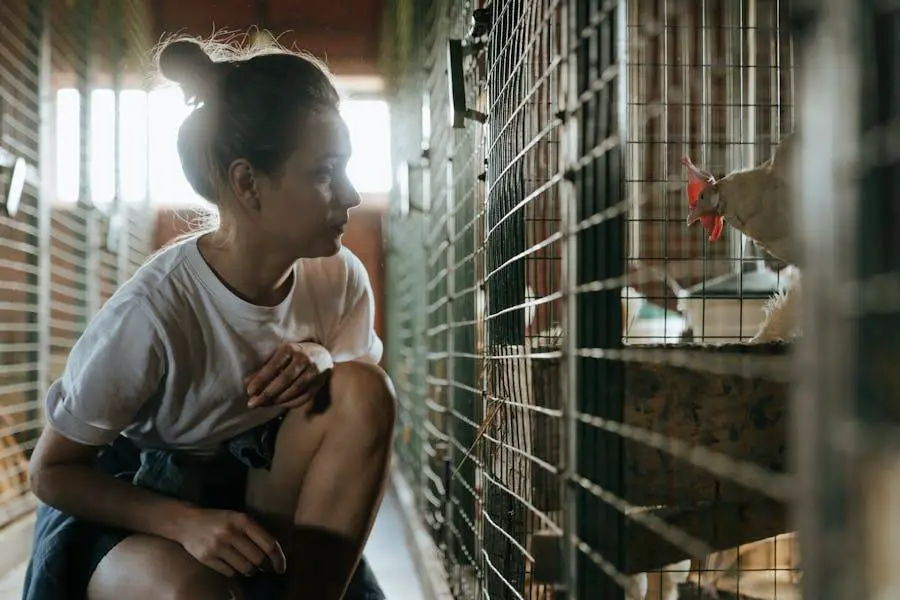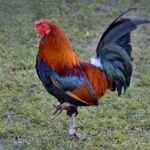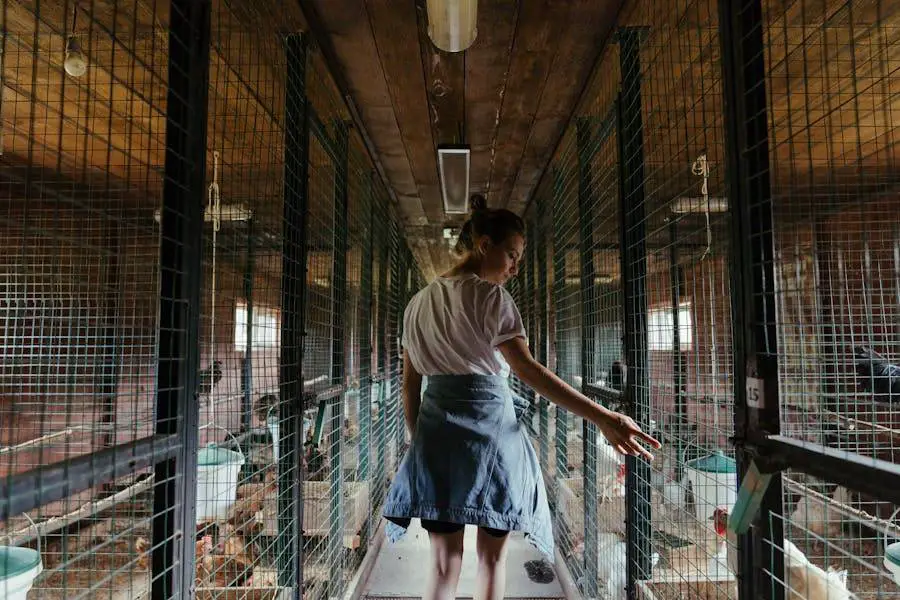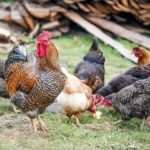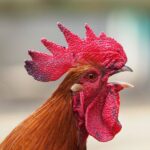Table of Contents
Clipping a chicken’s wings is often seen as a necessary measure to keep them safe and secure within their coop.

However, some chicken keepers prefer not to clip their birds’ wings, either due to ethical considerations or to allow the chickens to exhibit natural behaviors.
Luckily, there are several alternatives to clipping chicken wings that can keep your flock contained and safe.
This comprehensive guide will explore these alternatives in-depth, providing practical solutions for poultry owners seeking different strategies.
Fencing Solutions
Higher Fences
One of the simplest ways to keep your chickens grounded is by increasing the height of your fences. Chickens, while capable of flight, are not strong fliers.
A fence that’s high enough can deter most breeds from attempting to fly over it.
The exact height will depend on the breed, but generally, a fence that is 6 to 8 feet high should suffice for most backyard chicken breeds.
Electric Fences
Electric fences can serve as a powerful deterrent for chickens trying to fly or climb over.
While this might seem harsh, modern electric fences designed for poultry use deliver only a mild shock that causes discomfort rather than harm.
This discomfort is typically enough to discourage chickens from attempting to breach the fence again, effectively keeping them within the designated area.
Chicken Tractor
Benefits of a Chicken Tractor
A chicken tractor is essentially a mobile chicken coop without a floor, allowing chickens access to fresh grass and soil as it’s moved around your property.
This not only provides your birds with a varied diet but also prevents them from flying away as they’re always enclosed within the tractor.
Building Your Own Chicken Tractor
Building your own chicken tractor can be a rewarding DIY project. It allows you to customize the size and design to suit your flock’s specific needs.
The key elements to consider include sufficient space for your birds, nesting boxes, roosting bars, and a sturdy, predator-proof structure.
Free-Range Management
Supervised Free Ranging
If you have the time and patience, you can allow your chickens to free-range under supervision.
This means letting them out of their coop or pen but staying with them to deter potential predators and guide any escapees back to the flock.
Scheduled Free Ranging
Another option is to let your chickens free-range at specific times of the day when they’re less likely to fly away.
Chickens are usually less active early in the morning and late in the afternoon, making these ideal times for scheduled free-ranging.
Using Netting
Overhead Netting
Overhead netting is a great solution for keeping chickens contained without having to clip their wings.
The netting prevents them from flying over fences or walls and also offers some protection against aerial predators like hawks.
Enclosed Run with Netting
An enclosed run with netting on all sides, including the top, provides your chickens with a safe, contained outdoor space where they can scratch, peck, and dust bathe without wandering off.
This can be attached to their coop for easy access.
Training Chickens

Stay-At-Home Training
Believe it or not, chickens can be trained to stay within their designated area.
This typically involves conditioning them to associate the coop and run with food, safety, and comfort, encouraging them to return of their own accord.
Reward-Based Training
Reward-based training can also be effective. This involves providing treats or other positive reinforcement when your chickens stay within their boundaries, and discouraging them from venturing too far.
Breed Selection
Choosing Ground-Dwelling Breeds
Some chicken breeds are more inclined to stay grounded than others.
Breeds such as Orpingtons, Brahmas, and Cochins are known for their docile nature and preference for staying on the ground. Choosing such breeds can reduce the need for wing clipping.
Avoiding Flighty Breeds
Conversely, some breeds are more prone to flying than others. Mediterranean breeds like Leghorns and Anconas are known for being flighty.
If you’d rather not clip wings, it may be best to avoid such breeds.
Landscaping Techniques
Planting Barrier Shrubs
Planting dense shrubs around the perimeter of your chicken run can act as a natural barrier to prevent chickens from flying out.
Chickens are less likely to fly over a barrier they can’t see through, and shrubs also provide extra shade and shelter.
Using Water Features
Chickens dislike water and are unlikely to fly across a water feature. Installing a small pond or similar water feature can act as a deterrent and also enhance the aesthetics of your chicken area.
Providing Distractions
Toys for Chickens
Toys can be an effective way to keep your chickens entertained and distracted from the thought of flying away.
From simple hanging cabbages to more complex treat-dispensing toys, providing stimuli within the coop area can discourage wandering.
Dust Bathing Areas
Chickens naturally enjoy dust bathing, and providing a dedicated area for this activity can help keep them content and less prone to venturing out.
This could be a simple sandpit or a large container filled with a mix of sand and diatomaceous earth.
Using a Guardian Animal
Dogs Trained as Chicken Guardians
Certain dog breeds, like the Great Pyrenees or the Anatolian Shepherd, have been used for centuries as livestock guardians.
With proper training, these dogs can be excellent at keeping your flock within their boundaries and protecting them from predators.
Geese as Guardian Animals
Surprisingly, geese can also make effective chicken guardians. They are territorial by nature and can deter chickens from straying too far from the coop.
Plus, their loud honking can scare off potential poultry predators.
Creating Natural Barriers
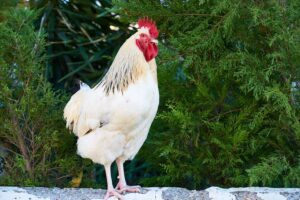
Planting Dense Trees
Planting dense, tall trees around the boundary of your chicken area can act as a natural barrier.
Chickens will usually not attempt to fly over something they can’t see through, making trees an excellent deterrent.
Utilizing a Hill or Slope
If your property has a natural hill or slope, you can use this to your advantage. Chickens prefer not to fly uphill, so positioning your chicken area at the bottom of a slope can help keep your birds grounded.
When is Clipping Necessary?
Safety Considerations
There may be instances when clipping a chicken’s wings becomes necessary for their safety.
If your property is near a busy road, or if predators are a significant concern, it might be safer to clip the wings to keep the chickens from wandering into danger.
Overly Flighty Breeds
While some breeds are naturally more grounded, others can be quite flighty, often flying over fences and barriers.
In such cases, wing clipping could be a practical solution to keep these birds within their designated areas.
Limited Space or Containment Options
If you’re dealing with limited space or lack the resources to implement some of the alternatives mentioned in this article, then clipping may be the most feasible option.
It’s a quick, cost-effective method of ensuring your chickens stay where they should.
High-Risk Areas
If you live in an area with a high risk of avian predators, it might be necessary to clip your chickens’ wings to prevent them from flying out of protected areas and becoming easy prey.
While overhead netting can provide some protection, wing clipping adds an extra layer of security.
Conclusion
Clipping chicken wings is not the only option for keeping your flock safe and secure.
From fencing solutions and chicken tractors to training techniques and careful breed selection, there are numerous alternatives that can be equally effective.
By considering these options, you can ensure your chickens enjoy a high quality of life while remaining within their designated boundaries.

